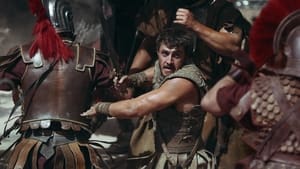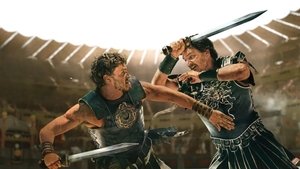
Video Sources 232 Views Report Error
Synopsis
Gladiator II continues the epic saga of honor, vengeance, and redemption, shifting the focus to Lucius, the young boy who once idolized the legendary hero Maximus Decimus Meridius. Years after witnessing Maximus’ death at the hands of his uncle, Commodus, Lucius is forced into the Colosseum when his home is conquered by Rome’s tyrannical rulers. With rage in his heart and the future of the Empire at stake, Lucius must draw strength from his past to avenge Maximus and restore glory to Rome.
This highly anticipated sequel promises to deliver the same intensity, drama, and spectacle as its predecessor, while exploring new themes of legacy, leadership, and resilience. Below, we delve into the story, characters, and significance of Gladiator II.
The Story of Gladiator II
A Hero’s Legacy
Years after the events of Gladiator, Rome has fallen under the control of ruthless emperors who rule with an iron fist. Lucius, now a grown man, lives in the shadow of Maximus’ legacy. The memory of Maximus’ bravery and sacrifice continues to inspire him, but it also serves as a painful reminder of the corruption and tyranny that plague Rome.
The Fall of Lucius’ Home
When Lucius’ home is conquered by Rome’s new rulers, he is captured and forced to fight in the Colosseum. Stripped of his freedom and dignity, Lucius channels his rage and despair into a burning desire for vengeance.
The Colosseum: A Stage for Redemption
The Colosseum becomes both a prison and a platform for Lucius. As he battles for survival, he begins to embody the same courage and honor that defined Maximus. His journey is not just about revenge but also about reclaiming the values that once made Rome great.
Key Themes in Gladiator II
1. Legacy and Inspiration
Lucius’ journey is deeply intertwined with Maximus’ legacy. The film explores how the actions of one hero can inspire future generations to rise against oppression.
2. Vengeance and Redemption
While vengeance drives Lucius, his ultimate goal is redemption—for himself, for Rome, and for the ideals Maximus fought to protect.
3. The Cost of Power
The film examines the corrupting influence of power, as Rome’s new emperors prioritize their own ambitions over the well-being of the people.
Character Analysis
Lucius: The Reluctant Hero
Lucius is a complex character, torn between his desire for vengeance and his duty to restore honor to Rome. His transformation from a disillusioned man to a fearless leader mirrors Maximus’ own journey.
The Tyrannical Emperors
Rome’s new rulers represent the worst aspects of absolute power. Their cruelty and greed serve as the catalyst for Lucius’ rebellion.
Maximus’ Legacy
Though Maximus is no longer alive, his presence looms large over the story. His ideals and sacrifices continue to shape Lucius’ actions and decisions.
Why Gladiator II Matters
Gladiator II is more than just a sequel—it’s a continuation of a story that resonates with audiences worldwide. Its themes of honor, justice, and resilience are timeless, making it a powerful narrative for modern viewers.
Original title Gladiator II
IMDb Rating 6.6 211,810 votes
TMDb Rating 6.772 3,009 votes
Director
Director
Cast
Lucius
Macrinus
General Acacius
Lucilla
Emperor Geta
Emperor Caracalla
Viggo
Gracchus
Jugurtha
Master of Ceremonies

































